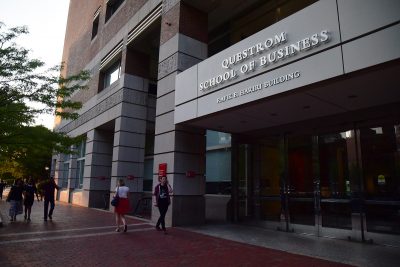Emotions are evident in stories, movies and behind closed doors. But on Wednesday, around 25 students sat in the Questrom School of Business to discover where emotions hide in the workplace and the gendered consequences of such emontionally-closetted culture.

Sanaz Mobasseri, assistant professor of management and organizations in Questrom, presented her research findings on how people react to emotion in the workplace, using emotion as a lens to see the gender gap in the workplace.
“People have some really deeply-rooted stereotypes about who has emotions, when it’s okay to express them, who tends to express them,” Mobasseri said in an interview Friday. “I mentioned that people think women are a lot more emotional than men, and that’s turned out to not be true.”
Mobasseri joined six other junior faculty accepted to the three-year Hariri Institute for Computing Junior Faculty Fellows Program in September 2019, Associate Director for Finance and Administration Natalie McKenna said in an interview before the event.
“We really aim to recognize outstanding early career computing and data-driven researchers at BU,” McKenna said. “What we want to do is connect them with one another and within the institute community at-large.”
Mobasseri is the only Questrom faculty from that year, McKenna said, and the only one conducting research about the workplace.
“It’s been great because it’s an interdisciplinary group, which means not everyone in the room and maybe cares about gender or emotions, but they have a different perspective or lens to bring to the research area,” Mobasseri said in the interview. “That’s just really stimulating and generative.”
Each fellow selected will spend three years in the program, researching and collaborating with other faculty in the network. In the “Meet Our Fellows” series at Hariri, McKenna said each fellow spends time presenting their research to students and faculty.
Mobasseri was the last fellow to give a presentation, which consisted of her data on how and when emotions are expressed in the workplace, how they are influenced and how gender fits into this. The paper is not yet published and is currently under revision, Mobasseri said.
“This is really what my paper is about, which is introducing a new way to think about susceptibility to other people’s emotions,” Mobasseri during the talk. “The main research question that I’m interested in is how gender might shape susceptibility to other people’s negativity.”
During the talk, Mobasseri said she measured this through tracking the emotional words used in email threads between employees at a data firm between 2009 and 2014 and how susceptible people are to replicating the emotion shown.
Though barred from seeing the content, she used a system called Linguistic Inquiry and Word Count that sorted words into categories such as positive, like compassion, support and amazed, or negative, such as annoyed and frustrated, and then reports the data back.
“I basically argue that there is a licensing that happens when someone else expresses negativity first,” Mobasseri said at the event Wednesday. “That gives women an opportunity that they otherwise wouldn’t have because of these normative restrictions.”
Her results found that although people used more positive words, negative words were reciprocated more often than positive ones and that women were less likely to express negative results than men in their emails. Mobasseri said this is beneficial for students to hear because expressing emotions can lead to more fulfillment and happiness at work.
“I hope for younger students, and for people who haven’t been in professional work environments yet, that it encourages them to feel more comfortable with expressing a range of emotion at work, seeing that everybody does so, even an email,” Mobasseri said in an interview.
Mobasseri said this event felt different because when she has given the talk previously, the crowd has been more knowledgeable about gender theory, but here, the audience was more curious about her methods of research than its contents.
“It was just a different energy,” Mobasseri said in the interview. “But still, the questions that I got were really helpful, and I got some really good suggestions for other avenues to pursue in the future.”
Elena Gonzalez, a sophomore in the College of General Studies, said she attended the event because she is taking a course titled “Sociological Methods,” and said she wanted to learn about a real-world application of research in the field.
Gonzalez said she was really intrigued by the type of research done.
“I never would have thought of looking at emails of the workplace to see if there were positive or negative emotions involved,” Gonzalez said after the talk. “It’s really inspiring to see how many things you could basically do an experiment on, how many things are testable in the world.”
McKenna said she thinks talks like these have a positive impact on students because it allows them to see how research operates and grows beyond a classroom setting.
“Often when they’re in a classroom setting, interacting with faculty they’re bound by the syllabus, whereas this really gives the students a firsthand look at what some of those faculty are actually engaging in outside of the classroom,” McKenna said during the interview. “And maybe it’ll inspire their own research.”



















































































































